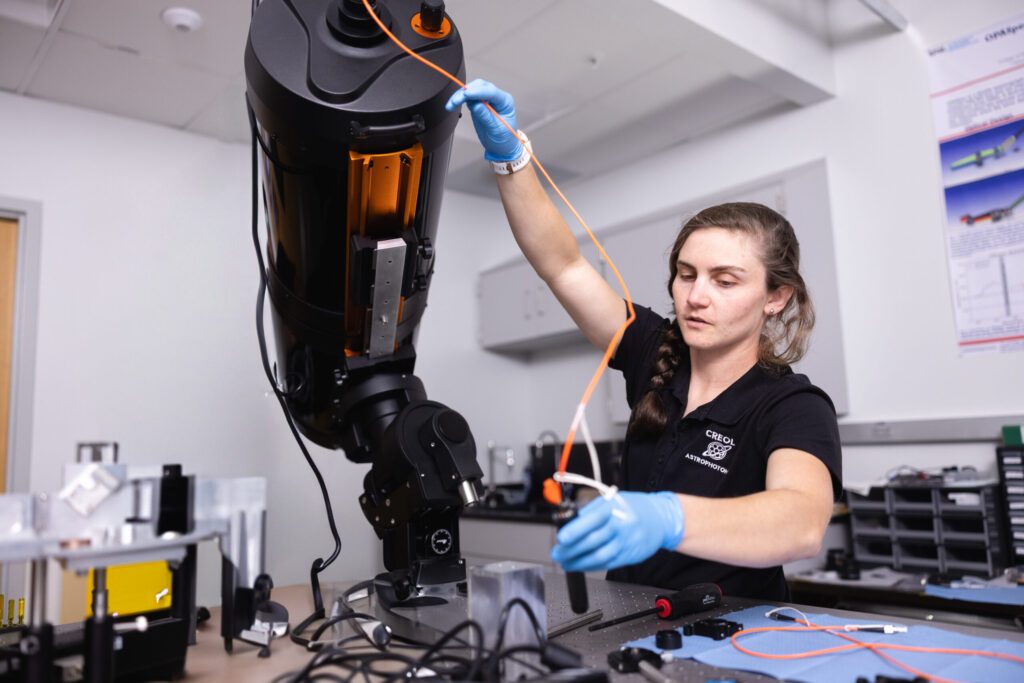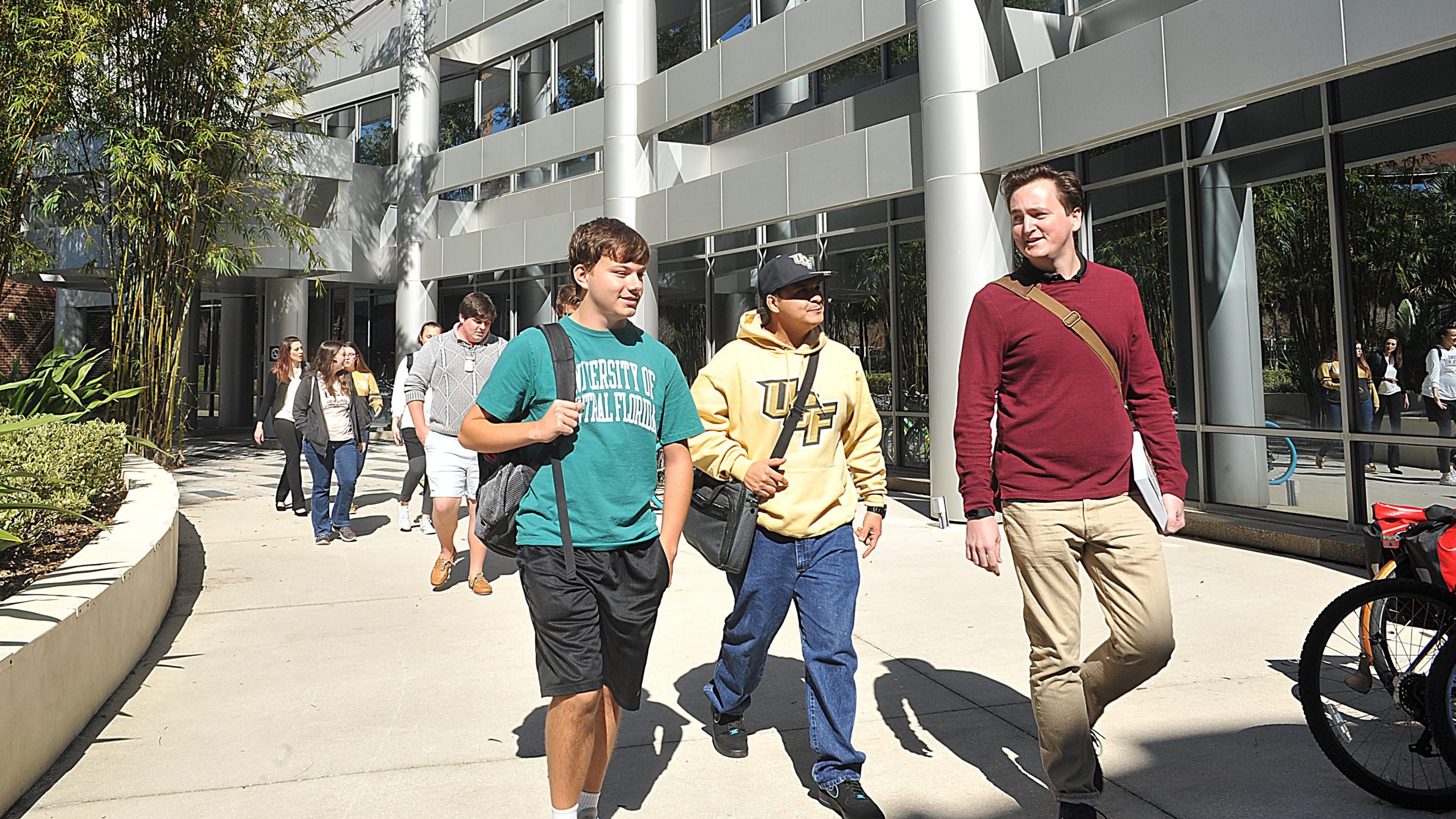A Doctorate to Fuel the Future
The Optics and Photonics Ph.D. program provides the highest-quality education in optical science and engineering, allowing students to conduct scholarly, fundamental, and applied research, while participating in the development of Florida’s and the nation’s technology-based industries.
Optics and Photonics PhD
The program requires a minimum of 72 credit hours:

- OSE 6115 - Interference, Diffraction and Coherence
- OSE 5312 - Light Matter Interaction
- OSE 6111 - Optical Wave Propagation
- OSE 6211 - Imaging & Optical Systems
- OSE 5525 - Laser Engineering OR OSE 6536 - Semiconductor Lasers
- OSE 6474 - Fundamentals of Optical Fiber Communications
Other courses with significant optics content may be accepted towards the Optics (OSE) coursework requirement, upon approval by the Associate Dean.
- OSE 6455c - Photonics Laboratory
- OSE 6526c - Laser Engineering Laboratory
- OSE 7980 - Doctoral Dissertation Hours
- No more than 18 hours combined of directed research (OSE 6918), doctoral research (OSE 7919), and independent studies (OSE 6908), may be counted toward the PhD degree.
Graduate Catalog
The Current Graduate Catalog contains all degree requirements and university policies regarding graduate education.
See Previous Years Graduate Catalogs.
PhD Handbook
The PhD handbook provides most details that students need to know to create their program of study and complete all requirements for the PhD degree.
PhD Pathway
Students should be enrolled full time (9 credit hours). Students should begin determining which faculty they will select as their dissertation advisor. Students must meet with the Associate Dean to discuss their plan of study in their second semester and submit it to the Graduate Program Office. A hold will be placed preventing registration until this is submitted. In the first year, students spend more time on courses in preparation for the qualifying exam, but must also meet research obligations as required by their advisor. At the end of the first year, all full-time students must take the qualifying exam. Part time students, with the approval of the Associate Dean, may delay taking qualifying exam until all core courses are completed.
Qualifying Exam: All students are given 2 opportunities to pass the qualifying exam. This is an oral exam based on material in the following courses:
- OSE 6115-Interference, Diffraction and Coherence
- OSE 5312-Light Matter Interaction
- OSE 6111-Optical Wave Propagation
- OSE 6211-Imaging and Optical Systems
See additional information on the Qualifying Exam here.
Students are required to take the Qualifying Exam at the first opportunity after all of the above listed courses have been taken. Those students failing on the first attempt must retake the exam at the very next attempt. Failure to take the exam at the required time will be regarded as equivalent to a failure of the exam.
The exam is waived for students earning an average GPA of 3.5 or higher in the four core courses. Students must have a minimum GPA of 3.0 in the four core courses to take the exam.
In the semester the student intends to graduate, an Intent to Graduate must be filed online in myUCF.
The announcement of dissertation defense is due to the Graduate Program Office at least 2 weeks prior to the scheduled oral defense date. After the ITG and announcement are submitted, students must follow the deadlines listed in the academic calendar for dissertation requirements.
After the defense, an exit interview must be scheduled. Please visit the Graduate Program Office to schedule this.
Fellowships
To ensure our students are successful no matter their financial situation, CREOL offers several fellowship opportunities to provide financial aid.
CREOL Graduate Fellowships are college-funded. Applicants for the PhD program will automatically be considered. Stipends are competitive and awarded in the amount of a minimum of $30,000 per year with a tuition waiver and health insurance.
University Trustees and Presidential Fellowships are offered by university in the amount of $25,000 and $20,000 per year with a tuition waiver and health insurance. Qualified applicants are nominated by the College.
Ph.D. Graduate Research Assistantships are funded by faculty research grants. Typically, these are awarded to Ph.D. students or M.S. students who have already decided to pursue the Ph.D. degree. Students are encouraged to apply for scholarships and fellowships offered by national and professional organizations such as the National Science Foundation (NSF), SPIE, and the Department of Defense (DOD).
Endowed Fellowships are funded by generous donations from our friends and supporters. These are available to supplement the CREOL Fellowships and Graduate Research Assistantships in the amount of $2,000 to $5,000.
This fellowship allows outstanding students to start their Ph.D. studies in the College and find a research advisor after they arrive. Most of our incoming Ph.D. students are recruited on this type of fellowship.
All Ph.D. applicants will automatically be considered for the ORC fellowship. Stipend: Minimum $25,000 annually, health insurance, tuition and fees included.
- Northrop Grumman
- Schwartz Fellowships
- Suchoski Fellowships
- Glebov Family-SPIE Fellowships
These additional resources are privately endowed fellowship awards for outstanding U.S. citizens and permanent residents. There is no separate application for these fellowships. They are selected by the admissions committee from among optics graduate applicants.

